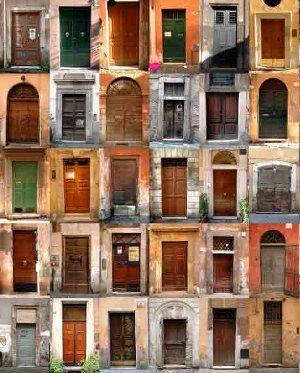The idea of stimulating the economy by encouraging consumption and planning the obsolescence of goods appeared in the wake of the Great Depression, at the precise moment when “useless beings” were being presented as lives without value, as superfluous existences. A simple coincidence? Maybe, but that doesn’t eliminate the fear – that we will soon treat human beings like disposable objects when they become useless – from quickly spreading. “When we no longer respect objects,” Fernand Dumont would say, “men become pseudo-objects.”
|
|
|
Source: The English Association ''Kings do not touch doors. They do not know that pleasure of pushing open in front of you, slowly or brusquely, one of those big familiar rectangular panels, and turning back to close it in its place again --holding a door in your arms." ". . . the pleasure of grabbing, at the belly of one of those tall obstacles to a room, its porcelain knob; the rapid duel in which you hold back your step for the instant it takes for the eye to open and the whole body to adapt to its new surroundings." "With a friendly hand you hold onto it still, before decisively pushing it back and closing yourself in another room -- a feeling of enclosure which is reenforced by the click of the handle's powerful, but well-oiled spring." Francis Ponge |
The evidence is clear that there is a subtle link between the connections being made with death and with objects. If certain objects are unique or have character, we might say that they are living, that they have a soul, something which the artisan transmitted to the objects he made by hand. “Inanimate objects, do you have a soul which sticks to our soul and forces it to love?” (Lamartine) We are so un-resigned to the disappearance of inanimate objects that we act to conserve them from generation to generation. Museums, a word derived from the word “muse,” are full of them: they are, indeed, cemeteries for objects. By respecting objects, we respect the work of humans, and we prolong the life of artists after their death. We hope that the object endures; it was made to endure, like the old iron ring that symbolizes life in the eyes of the shipwrecked:
Horror! the man whose voice the waters drown
Feels rent and wrecked his vessel as it sinks;
Feels 'neath him gape th' abyss and night; and thinks
On the old iron ring, of the safe quay. (6)
This ancient ring is the quintessential object, in all the plenitude of its presence, and it is death that reveals it to us. But it will not endure; it will be taken away by the cult of novelty, which appeared in the same context as did obsolescence and production on the assembly line. The intent here is not to deny the blessings that mass production has brought to humanity, nor the contribution of industrial design to aesthetics, but rather to identify a tendency that, associated with others, could reduce man to a pseudo-object that we may dispose of at our pleasure.



 The editor of L'Encyclopédie de L'Agora and well known newspaper chronicler and philosopher, analyses actuality through the looking glass of Belonging.
The editor of L'Encyclopédie de L'Agora and well known newspaper chronicler and philosopher, analyses actuality through the looking glass of Belonging.